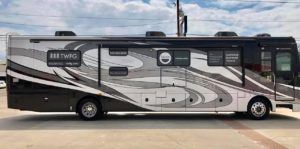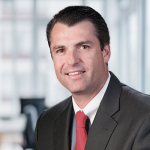

Weathering a storm like Hurricanes Harvey, Irma or Maria requires planning, insurance and grit.
In a span of 30 days the devastation from multiple hurricanes impacted millions of American families and businesses. When Harvey was offshore and still setting its sights on making landfall, our company, The Woodlands, Texas-based TWFG, was preparing to execute our catastrophe plan.
Pre-landfall, in preparation for Harvey we activated our CAT Team and readied for the aftermath. This consisted of testing our generators, filling gas cans, checking extension cords, stocking non-perishable food, stocking water supplies and fueling up our Customer Response Vehicle.
Each member of our team was tasked with following up with their staff members so we would know where people needed help. Our company ran pre- and post-landfall impact studies, sharing information with each of our locations, all active clients, and branch offices that would likely be impacted by wind or flood.

Post-landfall brought our CAT Team into the home office to ensure we were up and running to evaluate emergency needs. Fortunately, our office was spared, but unfortunately many of our team member’s homes and neighborhoods were flooded making them unable to safely make it into the office.
Harvey didn’t abate as it managed to linger long enough to create widespread flooding throughout the greater Houston area and the Southeast Texas region known as the Golden Triangle. Flooding delayed our field response down south since all routes had effectively been cut off.
Our home office established a war room to visualize the changing conditions of our 100 locations directly affected by Harvey’s wrath. At the peak of our needs close to 40 Branch locations were down while representing 70,000 to 100,000 clients.
Our sales team worked with each office to redirect calls for help and claims to the home office so that our clients could receive professional services when they most needed them most and to have their questions answered.
We learned quickly that the office closings were not the only casualty, as agents at over 10 locations also lost their personal homes due to hurricane winds, flooding or tornadoes. Five of our home office staff also lost homes or apartments and almost everyone knew of a close friend, family member or neighbor who had lost everything.
Collectively, our company family came together with external locations offering space and willing to take overflow calls. Our home office team created a seven-day work week to make sure we could stay current in providing service to all our customers.

I led several members of our management team in surveying the impacted areas. It truly was like entering a war zone with cars, buses, boats and trailers flipped over. Not a leaf left on a tree anywhere in the several counties, and the once lush cotton fields down south were turned into mud pits. No electricity, water, or cell service throws you back in time to when folks had to get face-to-face to have a conversation.
The clients we met with were shell-shocked and in need of empathy and reassurance that they would be taken care of. It’s impossible to overstate the need our clients have for communication — even if it’s just to say you haven’t forgotten them and we will get through this together.
Businesses and homeowners will have different recovery experiences depending on how well they planned and on the type of insurance coverages they have.
Universally, 85 percent of the homes flooded as a result of Hurricane Harvey did not carry flood insurance and many that did had coverage which did not reach adequate limits or did not include loss-of-use coverage.
For businesses, I recommend carrying business owner’s policies with loss of income, indirect loss, and off premises utilities coverages. Having these coverages will allow your businesses to rebuild, get reimbursed for lost profits and cover relocation expenses while re-establishing your business operations. A separate flood policy is needed for rising water as most policies do not cover flooding.
Businesses and individuals impacted by the recent Hurricane and flooding that find gaps in their insurance coverage can register with FEMA at https://www.fema.gov/disaster/4332. The SBA offers low-interest, long-term disaster loans to businesses of all sizes (including landlords), private non-profits (such as churches and charities), as well as to homeowners, and renters. Other disaster aid is available so I recommend visiting the FEMA site for more information.
Richard “Gordy” Bunch is founder, president and CEO of The Woodlands Financial Group. He is also chairman of The Woodlands Township Board of Directors.